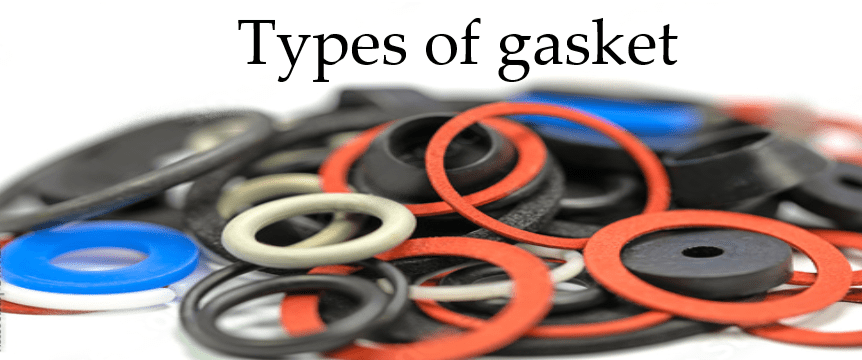

Gaskets are crucial components that are used in many machinery, equipment, and devices. They act as a mechanical seal between two or more mating surfaces and prevent leakage when those surfaces are under compression.
They can fill irregularities and improve the likelihood of sealability — particularly in high-pressure applications and flanges that have a high differential temperature range.
These pieces of hardware may seem small but are used in a number of different applications, there have many types of gasket materials such as piping, medical devices, electronics, vehicles, and others.
You can easily find many industrial gasket manufacturers in India offering gaskets in different materials from which you can choose the ones that fit your industrial needs.
Types of Gasket materials
Although the majority of gasket manufacturers offer gaskets in these common types of materials:
Rubber
Rubber gaskets are flexible and reliable, owing to which they are widely used in a variety of household applications. It is a soft material that allows its usage in a broad range of applications and various environments. Popular types of rubber in which you can find gaskets are nitrile, neoprene, and silicone. All these are great for preventing the leakage of liquids.
The most significant advantages of using rubber gaskets are that they are resistant to chemicals, acids, bases, solvents, oils, water, and extreme temperatures.
The gaskets last longer than any other comparable material. It can absorb pressure and makes the seal watertight. With more force exerted on it, the more it increases in strength.
Another benefit of using these gaskets is that they are non-toxic materials that do not affect any substances taking part in the process and the environment.
Rubber gaskets can also be blended with other materials to create a more effective and tighter seal.
Cork
Cork gaskets are highly compressible and flexible as compared to most of the other gasket materials. They expand in the situations of compression to ensure a tight seal and prevent leakage. When combined with elastomer bindings, these gaskets become highly flexible and perfect for applications involving oil, fuel, and solvents.
Cork is a versatile and cost-effective material for gaskets. It possesses oil and solvent-resistant properties, making it a popular sealing material for many industrial, construction, and other applications.
Different cork materials have different pressure and temperature ratings. Therefore, choose the one having particular specifications to meet your needs.
Metal
Metal gaskets are heavy-duty and can withstand extreme temperatures, pressure, and exposure to chemicals. The gaskets can easily withstand the test of time and are ideal for heat exchangers, compressors, turbines, and more due to their excellent physical properties.
You can easily get these gaskets from spiral wound gasket manufacturers in the specifications required. The right manufacturer will help you choose between gaskets like spiral wounds, metal jacketed, ring-type joint, kammprofile, and corrugated metal.
These metal gaskets have a metal wound outwards, mainly in a circular spiral, with the filler material wound in the same manner but rising from the opposite side, ensuring a tighter and leakage-proof seal.
Fiber
The fiber material is a broad category that includes various materials like cellulose and exotic aramid. These gaskets are mainly used in applications that involve high internal pressure and low temperature. However, these types of gaskets have a rubber binder to add some elasticity to the material.
They also offer excellent pressure resistance and can withstand high pressure that prevents their destruction in high-pressure industrial applications. The gaskets cause no corrosion of the sealing surfaces and prevent the impairment of the physical properties by media like acids or caustics.
Foam
Foam gaskets are generally used to provide a simple seal against air and dust. They are the best fit for applications that need a basic seal between two mating surfaces. The main purpose of these gaskets is to absorb shock and vibration. Therefore, they are typically used for environmental seals where the material is exposed to outdoor conditions like sunlight, dust, cold, and moisture as they are lightweight, waterproof, and flexible.
Plastic
Plastic gaskets offer excellent longevity and functionality and are used to prevent leaks and maintain temperature control in a wide range of applications. They effectively fill the space between two surfaces, eliminating the chances of friction and ensuring the long-lasting and hassle-free working ability of machines and equipment.
The gaskets also dampen the sound and vibration, are non-corrosive, abrasion-resistant, can manage fluctuations in temperature and pressure, and save on energy costs.
Conclusion
While there are numerous types of gaskets available today, the ones mentioned above are most common. But like every gasket cutting machine manufacturer in India knows, even the most common types of gaskets do not fit the needs of every project. Therefore, finding a gasket manufacturer specializing in custom gasket work can help you produce gaskets with the accurate size and functional capability you need.
We hope that this article has helped you understand the common types of gasket materials so that you can choose the right one for your industrial and residential applications. If you have any queries or questions, please let us know in the comments.